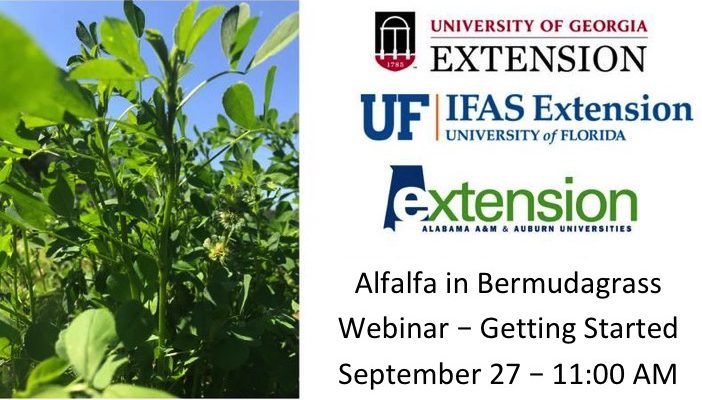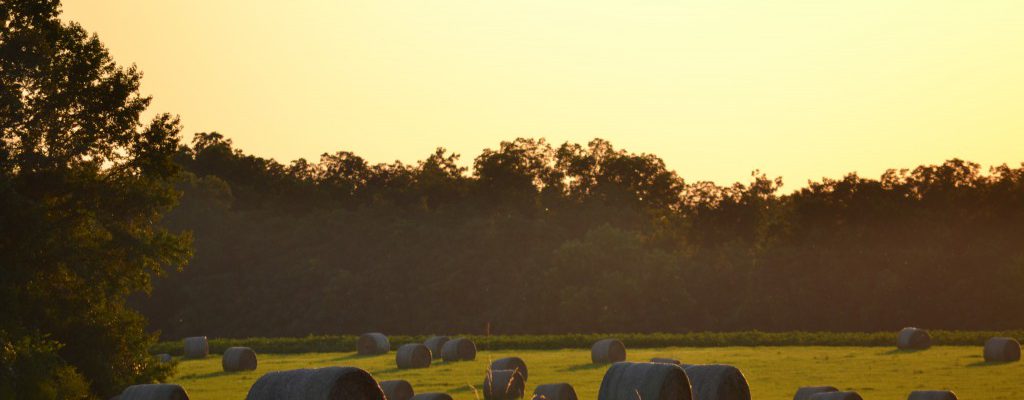Hay
-
By Ray Hicks Screven County CEC Forages are the basis of most of our livestock enterprises. Moreover, the nutritional make up of that forage should be the foundation of a balanced diet for our livestock but many times this is took for granted. Many factors (e.g. variety, maturity, growing conditions, handling practices, etc.) affect forage…
Posted in: Hay -

How is the recent weather affecting the Georgia hay crop? Similar to weather conditions in 2013, excess rain from May to July of 2018, followed by an August drought, have led to tremendous variation in the 2018 hay crop. Beef cattle producers in the Southeastern U.S. need to be on the lookout for cows experiencing…
-
If you have Incurred Losses as a Result of the Devastation of Hurricane Michael, PLEASE READ BELOW Dr. Jennifer J. Tucker, Asst. Professor, UGA CAES Tifton Dr. Dennis W. Hancock, Professor and Forage Extension Specialist, UGA CAES Athens Dr. R. Lawton Stewart, Jr., Assoc. Professor and Extension Animal Scientist, UGA CAES Athens Dr. Jacob R. Segers,…
-

Join us for a FREE Webinar that will discuss tips and tricks of establishing alfalfa into bermudagrass. It will provide valuable information for anyone interested in putting in alfalfa this fall! And the best part is…. you don’t even have to leave your house!
-
INSECT UPDATE (7/19/18): Bermudagrass Stem Maggot and Fall Army Worms have been spotted at treatable levels in many areas South of I – 20. Producers in and around this area need to stay vigilant!
-

By Ray Hicks Screven County CEC If you were like me, growing up around the farm, you couldn’t wait till you got old enough to have the responsibility of cutting the hay crop. Riding that tractor and mower, smelling that fresh mowed grass, knowing that the horses and cows were going to enjoy that hay…
Posted in: Hay -

By Will Lovett Bacon County CEC There are several perennial warm-season grasses that are native to the Eastern United States. The Native Warm Season Grasses (NWSG) most commonly used for forage are switchgrass, eastern gamagrass, indian grass, big bluestem and little bluestem. These NWSG are clump-forming, bunchgrasses that grow during the summer. They can provide…
-

By Ray Hicks Screven County CEC As we wind down from the summer it is time to start looking at budgets for next year. As a cattle producer, feed is always one of the most costly inputs. Now as Dr. Dennis Hancock, Georgia Extension Forage Specialist, says “Grass grows Grass! And the most efficient way…
Posted in: Hay -

By Carole Knight Bulloch County CEA The process of baling hay has come a long way since the late 1800’s when Cyrus McCormick’s reaper design used a knotter to bundle and bind hay. The technology has improved but the goal has remained the same – safely store hay to feed to livestock at a later…
-
By Jeremy Kichler Colquitt County CEC The combination of humidity and moisture this spring has been a great challenge to many hay producers across the state.. The single most important “producer-controlled” factor influencing hay quality is the stage of maturity at harvest. However, unfavorable weather conditions in the Southeast can make it difficult to harvest…
Posted in: Hay